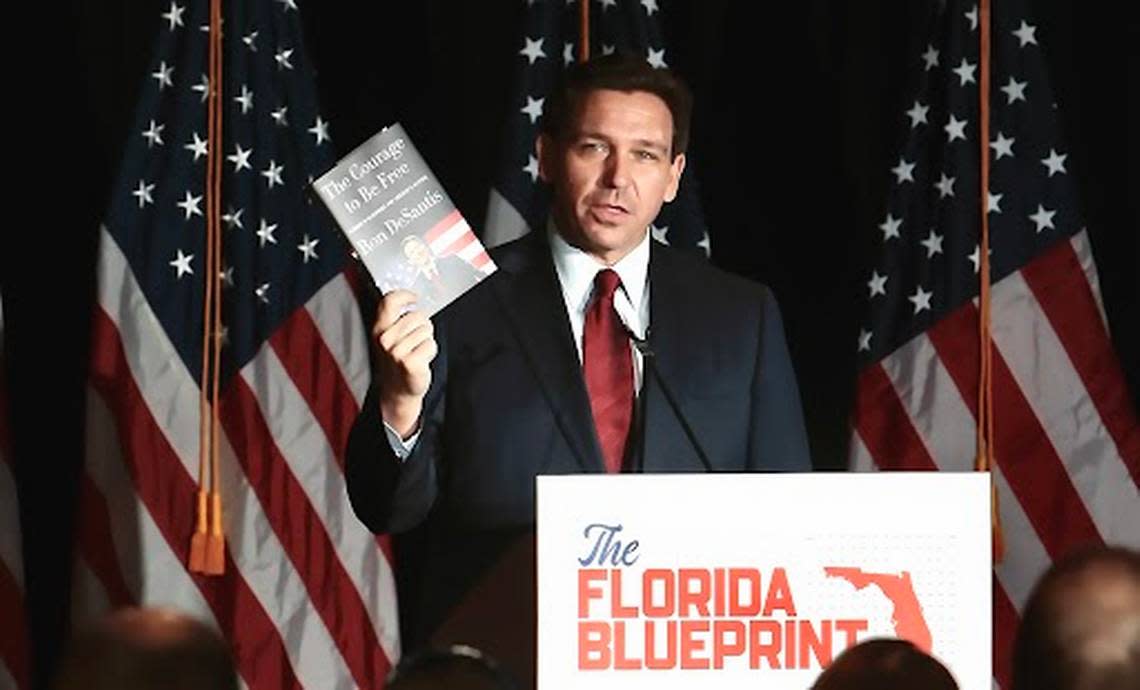DeSantis vetoes bill preempting local regulation of vacation rentals

- Oops!Something went wrong.Please try again later.
- Oops!Something went wrong.Please try again later.
After an alliance of strange bedfellows urged Gov. Ron DeSantis to veto a bill preempting local governments from regulating Airbnbs and other vacation rentals, he quietly did just that on Thursday evening.
But the fight is far from over.
Cities and counties campaigned against the bill. So did vacation-rental companies like Airbnb and management companies like Vtrips, but for opposite reasons.
Municipalities opposed the legislation because they were losing control. The companies opposed it because they didn’t get enough control, said Jack Cory, a lobbyist for the City of Jacksonville Beach.
“That’s why it’s a strange coalition. The enemy of my enemy is my friend right now,” said Cory. “But that doesn’t mean … that we’re all going to be singing kumbaya next year.”
Tiffany Edwards, executive director for the Florida Professional Vacation Rental Coalition, said in a statement to the Herald/Times that there was a “better solution for local communities and vacation rentals” than the one outlined in the bill, SB 280, but “all stakeholders need to work together to achieve it.” The CEO of Vtrips is chair of the coalition.
Airbnb declined to comment and the Florida Alliance for Vacation Rentals could not be reached in time for publication.
The bill had been several years in the making. In outlining how local governments can regulate vacation rentals, it overrode detailed policies that cities and county governments throughout Florida have put into place since 2014.
Many of those policies relate to how local governments deal with violations like having too many people at a party or noise complaints, which can often be tallied up on the same night, resulting in the suspension of a vacation rental in some places for months. But in the bill, a single month suspension would require violations on five separate days during a two-month period.
In a letter to Secretary of State Cord Byrd, DeSantis said the bill would have prevented “virtually all local regulation of vacation rentals even though the vacation rental markets are far from uniform across the various regions of the state.”
The bill had plenty of critics.
State Sen. Ileana Garcia, a Republican from Miami, said the bill would have forced Miami-Dade “to start from scratch” regarding the regulation of vacation rentals.
“We’d finally come to a good landing spot,” said Garcia, among the 16 senators who voted against the legislation.
State Sen. Jason Pizzo, a Democrat based in Hollywood, said the bill simply didn’t do enough to enforce violations by vacation-rental companies.
“When you parse out how many violations need to occur … it’s tantamount to really being no control at all,” said Pizzo.
Steve Milo, the CEO and founder of VTrips, listed in a LinkedIn post on March 5 several reasons why Florida property managers and owners should “immediately call or email [their] House representatives and tell them to VOTE NO on Senate Bill 280.”
Those reasons included the fact that the bill allowed local governments to regulate rental licenses, which was currently done at the state level, and charge for them for it. They also included that the bill created “strict occupancy limits” while failing to provide consumer protection.
Airbnb also opposed the bill. A letter forwarded to the Herald/Times urged hosts on March 27 to email DeSantis asking him to veto the legislation, arguing that the measure “would increase the regulatory burden on Hosts at the local and state level, undermine private property rights, and empower local governments to add inspection requirements and revoke [their] state license.”
On their website, the Florida Alliance for Vacation Rentals posted a pre-written letter that anyone could sign onto asking DeSantis to veto the bill. The letter stated the “legislation places more daily operational burdens” on the Florida Department of Business and Professional Regulation, “an already understaffed state agency.”
“Despite funding this new statute with over $3.8 million taxpayer dollars each year, it is highly unlikely that DBPR will be able to fill dozens of currently open inspector positions, let alone 9 more full-time state employees specific to vacation rentals,” the letter stated.
One group that wanted the legislation to go into effect was the Florida Restaurant and Lodging Association. In a statement released Thursday evening, the association said the measure was a “solid framework and first step for regulatory reform in the sector.”
“We are disappointed with Governor DeSantis’ veto but will continue with our efforts to work toward a resolution and ensure equity across Florida’s lodging industry — from vacation rentals to hotels — to best serve our guests and promote their safety,” the association said.


